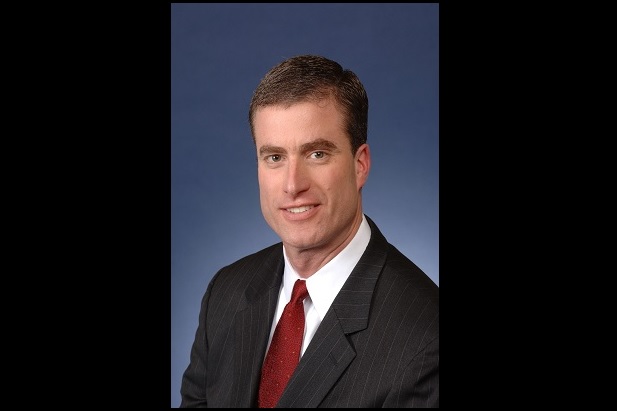 Chris Barrett is a senior director at PensionmarkMeridien, focused on corporate retirement plans and executive benefits. BenefitsPRO caught up with Barrett as the industry faces a time of great change — and opportunity.
Chris Barrett is a senior director at PensionmarkMeridien, focused on corporate retirement plans and executive benefits. BenefitsPRO caught up with Barrett as the industry faces a time of great change — and opportunity.
C.J. Marwitz: How did you get your start in the financial industry?
I graduated with a history degree in 1982 into a weak job market. I didn't really know what I wanted to do and finding a job proved difficult. Then a close friend of mine from high school recruited me to work under him for a mutual fund company in what was, in effect, a multi-level marketing scheme. The good news was I got my Series 6 and learned enough about investments to be intrigued.
With my newly minted license, I quit that firm and answered an ad in the Boston Globe to be a service representative at MFS. I started answering calls on the service line for brokers and agents. I progressed into a phone sales position and ultimately wholesaling retirement plans. I spent the first 10 years of my career learning the business from the bottom up at a great firm.
CM: What do you currently do?
I am an advisor with PensionmarkMeridien in Providence, Rhode Island. I maintain my brokerage licenses but for the vast majority of our clients I act as a fiduciary investment advisor. My primary focus is serving plan sponsors and their participants in both qualified (401(k), defined benefit, etc.) and non-qualified (deferred compensation) plans.
I help sponsors navigate the complexities of offering and operating retirement plans. Issues like plan design, vendor and investment selection and monitoring are critical for the success of a plan. We also spend time helping sponsors with fiduciary liability by providing a road map to satisfy those responsibilities. We spend a lot of time educating and engaging them to ensure adequate participation and contribution rates to help them hit their retirement savings goals.
We also deliver comprehensive financial wellness programs. They're a great additional benefit that can reduce financial stress and create happier, more productive employees.
CM: What's the biggest challenge you see advisors dealing with right now?
I think the biggest challenge for many advisors is practice management. Sponsors and participants need more and more services (i.e., financial wellness programs). At the same time, fee compression and competition are acting as a ceiling on fees they can charge.
As a result, operating efficiently is more important than ever in order to run a profitable practice. In short, it requires an investment in technology and back office support. I know for my team at Meridien, it was a large reason we affiliated with Pensionmark. Having access to the best resources to serve our clients in an efficient manner is more important than ever.
CM: What's one question you wish someone would ask you and how would you answer it?
I wish someone would ask me "What can advisors do to improve 401(k) plans?"
Sponsors should demand more comprehensive services from advisors. For example, advisors should be able to provide a proven process for selection and monitoring of investment options and act as either a 3(21) fiduciary advisor or a 3(38) fiduciary investment manager. They should be experts in all aspects of plan design. Vendors know the rules but they don't know the sponsor and their particular situation. Advisors play a critical role in advising on issues such as contribution budgeting, auto features, matching formulas, eligibility.
The IRS and DOL require a documented process for managing a plan. Sponsors shouldn't have to become experts on these issues, yet that's exactly what happens in many cases. While many recordkeepers provide tools, it is up to the sponsor to know how to use the tools and execute the process. Advisors should take an active role in helping sponsors make decisions and document these decisions. This is a critical service responsibility.
And advisors should play an active role in participant education/engagement. Delivering financial wellness programs and financial planning to all participants (not just the C suite) is critical.
Too often the advisor has a relationship with a decision maker but no real retirement expertise. Yet because that advisor is a trusted resource, the sponsor entrusts the 401(k) plan to them. That's akin to going to an eye doctor after hurting your leg. The eye doctor may be a great one, but you wouldn't want him or her fixing your broken leg. People's retirements are at stake. It's too important not to get comprehensive service and fiduciary advice from your advisory team.
CM: What was a particularly satisfying moment you had in a job or an "ah ha" moment?
I was speaking at an enrollment meeting in New York City a few years ago. It was in a small conference room that was packed with participants. It was hot, cramped and not an ideal environment for an educational meeting. I was representing one of the investment managers in the menu. I got up and delivered my presentation as I had done hundreds of times before. As the questions wound down and I got ready to leave, I realized I was going to be late for my next meeting, so I started to make a beeline through the crowd to the door. I was stopped by a participant. All I could think was "great, now I'm going to be even later."
But she was insistent, so I stopped and asked how I could help. She wanted to thank me. Something I had said had hit home with her and she now felt like she understood the plan in a way she hadn't before. It really stopped me in my tracks. It was a great feeling to get that thank you. I promised myself that I would never forget what's truly important about what I do. It's all about the participants and trying to get them to their retirement goals.
CM: What changes and trends in the industry have you noticed or experienced?
I think the biggest changes/trends in the last five years have been fee compression, the rise of target dates, transparency and commoditization. With fee compression, it doesn't matter if you are a recordkeeper, investment manager or advisor, your margins have compressed. I think it has hit the investment managers particularly hard. The DOL rule propagated under the Obama DOL (and subsequently negated by the Trump administration) put a heavy emphasis on fees. Plan sponsors and advisors abandoned actively managed products in favor of index offerings. While there are still massive positions in existing plans with active managers, currently contributions into index funds dwarf active managers.
The margins of recordkeepers have shrunk as well, fueling a wave of consolidation. Advisory firms have suffered too, and many ceased marketing to retirement plans because they didn't have the scale to service the business profitably.
Target-date funds are another change. I'm not going to quote specific stats but suffice it to say that target-date fund assets have grown substantially in the last 10 years and currently dominate contribution flows into 401(k) plans.
Transparency is another issue. The fee structures of 401(k) plans can be complex, and transparency is not perfect, but it has improved dramatically. There are basically three entities that need to be paid for a plan to work: the investment manager, the advisor and the recordkeeper. Complexities arise when one group's fees are subsidized by another, for example, an investment manager is also recordkeeping a 401(k) plan and has some of their funds in the plan. They can discount their recordkeeping fees because they are being paid for managing the funds. There is nothing wrong with this arrangement as long as it's disclosed. The challenge for plan sponsors is understanding the disclosure and comparing or benchmarking to an alternative offering. The good news is that if they request a 408 (b) (2) disclosure from the recordkeeper all fees should be disclosed in relatively plain English.
Commoditization is another change, and in many ways is a good thing for sponsors and participants. Instead of focusing on bells and whistles, it allows decisionmaking based on the quality and value of service being provided.
I'm not saying that all vendors are exactly the same. It's just that there are very few differences in terms of services and fund offerings between the "best" recordkeeper and the fifth "best."
CM: How have plan sponsors and plan sponsors' concerns changed over the years?
Sponsors have always wanted a plan that would deliver a benefit to their employees and require a minimal amount of time to operate and administer. At the core, I don't think this has changed.
In other ways, concerns have changed dramatically. As I mentioned earlier, the DOL rule promulgated under the Obama administration was an important factor in the increased focus on fiduciary concerns. There have also been many high profile lawsuits over fund fees and sponsors not using the least expensive available share class. So they have been more focused on understanding and reducing their fiduciary responsibility. Fee compression has largely been a by-product of these concerns.
Concerns about employee financial wellness have been heightened too. The prevailing wisdom in the past was that if you sponsored a plan for your employees (and performed your legally required duties) then being ready to retire on time was your employees' problem. I think sponsors are beginning to understand that there is a real tangible benefit to having employees retire "on time." Financial wellness programs can be an effective solution.
CM: Where do you find inspiration or motivation?
In terms of motivation, I am happiest when I am building something or solving a problem. Sometimes that's in the form of a project around the house, like a treehouse for my kids. At work, it could come from improving a client's plan or helping a participant take an action to help hit their goals. Helping our team is also a huge motivator. In terms of inspiration, I'm a huge sports fan and take inspiration from how athletes (and others) deal with adversity and figure out ways to persevere and succeed. I also get to go to conferences and hear from some great speakers. There's always a nugget of inspiration I take away from those experiences.
CM: Finish this sentence: The key to success in this industry going forward is…
Being adaptable to change. The industry is changing products, pricing, the competitive landscape, client expectations. We have to stay in front of the changes to succeed. Clients don't want yesterday's solution to tomorrow's challenge. It's up to us to adapt and continue to deliver for our clients.
BenefitsPRO is celebrating the unsung heroes in the retirement industry. Email [email protected] with your nominee's name, and we might feature them in an upcoming Q&A.
© 2025 ALM Global, LLC, All Rights Reserved. Request academic re-use from www.copyright.com. All other uses, submit a request to [email protected]. For more information visit Asset & Logo Licensing.








